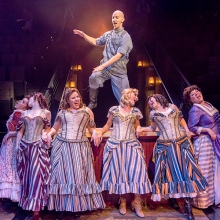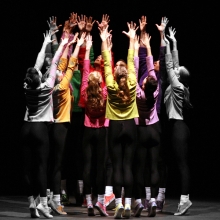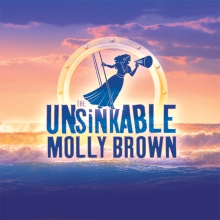Filichia Features: Say "I Do!" to The Wedding Singer

Filichia Features: Say "I Do!" to The Wedding Singer
Haven't yet decided on your summer musical?
Given that June is the time of year most associated with weddings, during that month consider producing The Wedding Singer.
It will appeal to many age groups. First off, couples who are dating and contemplating marriage - as well as engaged duos that have already set the date - will be automatically interested in anything involving nuptials.
Enjoying it just as much if not more will be those who were teens and twentysomethings in the '80s - the period in which the 2006 tuner is set. Composer Matthew Sklar and lyricist Chad Beguelin have beautifully captured those silly days of yesteryear.
So tell your choreographer to brush up on The Robo Cop, The Running Man, The Roger Rabbit and The Pac Man. Your audiences who lived through those times will squeal in delight when you return their youth to them.
Sklar was j-u-s-t old enough as the '80s began to remember the sound of those AM Radio bubble-gum hits. And how good a composer is Sklar? Put it this way: Marvin Hamlisch so liked high-schooler Sklar's music that when the kid was applying to colleges, Hamlisch provided recommendation letters.
Beguelin knows the slang of the time, which is why he created a song centered on the word that truly came of age in the '80s: "Awesome." Then he collaborated on the book with Tim Herlihy, the screenwriter of the 1998 Wedding Singer film that has Robbie Hart as its title character.
At a wedding that Robbie's working, the best man makes a vulgar and incriminating remark that could cast a terrible pall over the reception - until Robbie does some quick thinking that smooths it over. Later, when one of his band members wants to cancel an upcoming gig, Robbie reacts with an aghast "We're not going to show up on the most important night in someone's life?!?"
He's a good guy. He cares - so we care.
He also loves being the frontman of a band almost as much as he loves Linda, whom he's marrying tomorrow.
That's what he thinks. "A Note from Linda" is her kiss-off letter that she dictates aloud right down to adding a "smiley-face." Now we not only hate her for waiting until the day of the wedding to dump Robbie, but also from her wan attempt at humor.
And how hard Robbie worked to write a song just for her, although he got help from a waitress he'd just met: Julia Sullivan. This happens after her thoroughly winning song "Someday" in which she'd envisioned her own future wedding to Glen. Virtually every musical has a leading lady who reveals who she is and what she wants in her first song, but precious few make us fall completely in love with her by the time the song ends. "Someday" is one of them.
At the next wedding Robbie plays, he's so down that he comes down hard on marriage. Some guests respond by throwing him out of the room and into the restaurant's dumpster. Julia soon enters it, for she's the kind of kind woman who's there to lend a sympathetic ear and shoulder whenever anyone's in trouble.
Careful with this scene! In the original production, nothing was made of the fact that dumpsters smell terrible; Robbie and Julia could have just as easily been in an elevator. So ensure that Julia is at least aware of where she is and that her nose is being assaulted. That she's willing to endure the powerful odor to make Robbie feel better gives us more reason to cherish her.
Robbie does. Alas, her boyfriend Glen recently popped the question (in a delightful song). And how can Robbie and his meager income compete with ruthless Wall-Streeter Glen?
Only after Robbie discovers that Glen is ruthless with women -- and is poised to cheat on Julia even before they're married - does he decide to compete for her. Assuming that money is part of Glen's appeal, Robbie decides to join the corporate world.
Seeing characters sacrifice for others is the best way to bond them with an audience. The delicious surprise is that Julia is not happy that Robbie's put his musical dreams beyond the back burner. Julia knows that money can buy some happiness -- yes, of course -- but only to a point. People do better in jobs in which they have intense interest, and the business world will not make Robbie eager to get to work each morning; music, however, got him hot to work each night.
In keeping with the theory that people should experience friendship and then love, Robbie and Julia do precisely that. The Wedding Singer is more convincing than those hundred million musicals where love at first sight is considered enough for us to hope the two people become a couple. We never doubt that Julia and Robbie will say "I do" in due time; we're just as happy as they when it happens.
The executives at New Jersey Convention and Visitors Bureau may not be thrilled at how their town of Ridgefield is pictured. Some characters need better elocution, and others have less-than-lofty values. Unglamorous water heaters, oil tanks, and toilet stalls all make appearances, too. But Jersey boys and girls who have a sense of humor about themselves will have a wonderful time.
On Broadway, lead producer Margo Lion purposely sought a performer connected to pop music rather than Broadway. Don't be afraid to check out a few local bands and offer them the chance to be in your production. There are good roles for Sammy, who offers clueless vulgarity, and George, who is a gay man whose sexual preference doesn't unnerve anyone in the group.
Julia works at an establishment called "A Touch of Class," so she should have precisely that. There are solid roles for the unfeeling Linda, the slick Glen and the warm-hearted Holly (Julia's friend who helps the romance along).
That takes care of your young actors, but old age must be served, for Robbie lives with his beloved grandmother. Has there ever been an audience that doesn't adore seeing a wizened granny not act her age and have an active sex life? So here's an ideal guffaw-getting role - not too small, not too demanding -- for the most audacious and adored female golden-ager in your company.
Never mind June: The Wedding Singer should delight your audiences any month of the year. You've probably already done that musical about Roxie Hart; now try the one about Robbie Hart.
You may e-mail Peter at pfilichia@aol.com. Check out his weekly column each Monday at www.broadwayselect.comand Tuesday at www.masterworksbroadway.com . His book, The Great Parade: Broadway's Astonishing, Never-To-Be Forgotten 1963-1964 Season is now available at www.amazon.com.
Share
Callboard
-
Shake and shimmy it with the #Hairspray20Challenge! Join MTI and Broadway Media in celebrating 20 years of #Hairspray. Duet this here or find us on TikTok! Special thanks to @broadwaymedia and @jammyprod. Choreography Guides are a licensor official resource that provides step-by-step instruction from Broadway and professional choreographers for your productions! Visit @broadwaymedia to learn more. #mtishows #youcantstopthebeat #hairspraymusical #goodmorningbaltimore
View on Instagram

























